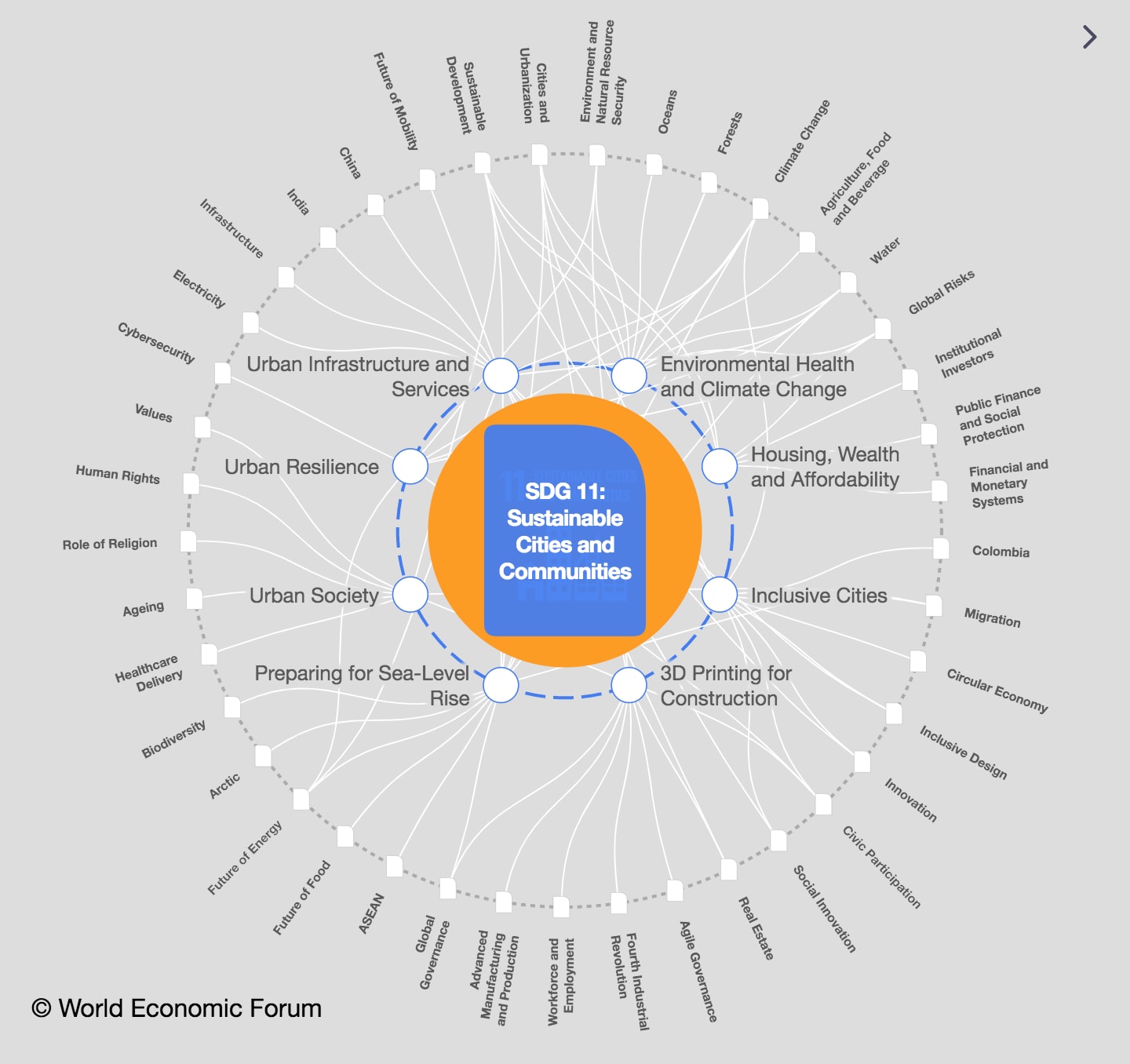Cities are at a greater risk of heat stress, new study finds

The very design of cities can make them dangerous heat traps. Image: Art Wager

Get involved with our crowdsourced digital platform to deliver impact at scale
Stay up to date:
SDG 11: Sustainable Cities and Communities
- The very design of cities makes them more susceptible to rising temperatures caused by global warming.
- Cities are at a greater risk of heat stress, water scarcity, air pollution and energy insecurity due to their design and population density.
- Shade coverings, returning to traditional adobe building materials and designing courtyards with cooling towers can limit the risks.
While cities bear a heavy cost from the climate crisis, they could also lead the way in implementing climate adaptation strategies.
A recent study published by Nature Climate Change found that cities are at a greater risk than suburban and rural areas for heat stress, water scarcity, air pollution and energy insecurity due to their design and population density, Science Daily reported.
Until recently, the ability to predict these future climate scenarios in cities remained unclear.
"Incorporating these types of small-scale variables into climate modeling is crucial for understanding future urban climate," Lei Zhao, a University of Illinois Urbana Champaign engineer and lead researcher of the study told Science Daily. "However, finding a way to include them in global-scale models poses major resolution, scale and computational challenges."
The team of researchers from the University of Illinois at Urbana-Champaign and Princeton University approached this "urban-to-global information gap" by combining a broader-scale process that predicts how greenhouse gas emissions impact the global climate and a statistical model that copies a model for urban landscapes, according to Science Daily.
By applying this technique to data from 26 global climate models, the researchers were able to make projections on temperature and humidity changes in cities through the end of the century.
"The model predicts that by the end of this century, average warming across global cities will increase by 1.9 degrees Celsius with intermediate emissions and 4.4 C with high emissions," Zhao told Science Daily.

"Our findings highlight the critical need for global projections of local urban climates for climate-sensitive urban areas," Zhao added. "This could give city planners the support they need to encourage solutions such as green infrastructure intervention to reduce urban heat stress on large scales."
In 2019, the Maricopa County Department of Public Health, in Phoenix, Arizona, reported 197 heat-related fatalities.
"It was the highest number of heat-associated deaths on record for the county, and the fourth year in a row of record-setting heat deaths there," The Washington Post reported. "Those numbers are only expected to increase as the climate changes."
This year, Phoenix recorded its two hottest months in July and August. Building tall structures that trap heat and paving over the natural desert, which absorbs heat, are some of the ways in which the city's development has made it even hotter, the article stated.
"We talk about climate… as something mysterious and ambiguous that comes from the sky. But it is also something we are driving with the way we are paving our streets," David Hondula, a sustainability scientist at Arizona State University told The Washington Post. "Urbanization is a critical part of the story."
Solutions like Nature's Cooling Systems, a project aiming to implement green design in communities, could alleviate heat stress in Phoenix's neighborhoods.
The project, a collaboration between The Nature Conservancy, Arizona State University and the Maricopa County Department of Public Health, is designed to "revolutionize urban design by inverting the traditional top-down approach in which city planners dictate design from air-conditioned high-rises, routinely failing low-income areas," Scientific American reported. "The program — along with a handful of other revitalization projects burgeoning around the country — views locals as experts on their neighborhoods."
Implementing shade coverings in neighborhoods, returning to traditional adobe building materials and designing courtyards that feature cooling towers are a few ideas being considered, according to Scientific American.
While communities in Phoenix adapt, hotter temperatures are a reality for more than just Arizonans. California, Colorado, Nevada, New Mexico and Utah also recorded their warmest Augusts on record this year, according to NOAA, making adaptation strategies a necessity for a warming country.
"We understand that necessity breeds invention," Kate Gallego, Phoenix's mayor, told The Washington Post. "And we hope… that we will produce the innovations that make it possible for people to adapt."
Don't miss any update on this topic
Create a free account and access your personalized content collection with our latest publications and analyses.
License and Republishing
World Economic Forum articles may be republished in accordance with the Creative Commons Attribution-NonCommercial-NoDerivatives 4.0 International Public License, and in accordance with our Terms of Use.
The views expressed in this article are those of the author alone and not the World Economic Forum.
Related topics:
The Agenda Weekly
A weekly update of the most important issues driving the global agenda
You can unsubscribe at any time using the link in our emails. For more details, review our privacy policy.
More on Climate ActionSee all
Santiago Gowland
April 24, 2024
Amanda Young and Ginelle Greene-Dewasmes
April 23, 2024
Andrea Willige
April 23, 2024
Agustin Rosello, Anali Bustos, Fernando Morales de Rueda, Jennifer Hong and Paula Sarigumba
April 23, 2024
Carlos Correa
April 22, 2024
Shyam Bishen and Annika Green
April 22, 2024






